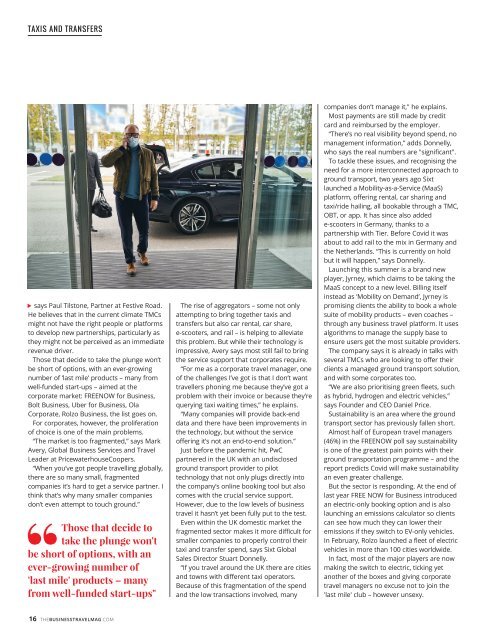Business Travel March-April-2021
Create successful ePaper yourself
Turn your PDF publications into a flip-book with our unique Google optimized e-Paper software.
taxis and transfers<br />
says Paul Tilstone, Partner at Festive Road.<br />
He believes that in the current climate TMCs<br />
might not have the right people or platforms<br />
to develop new partnerships, particularly as<br />
they might not be perceived as an immediate<br />
revenue driver.<br />
Those that decide to take the plunge won’t<br />
be short of options, with an ever-growing<br />
number of ‘last mile’ products – many from<br />
well-funded start-ups – aimed at the<br />
corporate market: FREENOW for <strong>Business</strong>,<br />
Bolt <strong>Business</strong>, Uber for <strong>Business</strong>, Ola<br />
Corporate, Rolzo <strong>Business</strong>, the list goes on.<br />
For corporates, however, the proliferation<br />
of choice is one of the main problems.<br />
“The market is too fragmented,” says Mark<br />
Avery, Global <strong>Business</strong> Services and <strong>Travel</strong><br />
Leader at PricewaterhouseCoopers.<br />
“When you’ve got people travelling globally,<br />
there are so many small, fragmented<br />
companies it’s hard to get a service partner. I<br />
think that’s why many smaller companies<br />
don’t even attempt to touch ground.”<br />
Those that decide to<br />
take the plunge won't<br />
be short of options, with an<br />
ever-growing number of<br />
'last mile' products – many<br />
from well-funded start-ups"<br />
The rise of aggregators – some not only<br />
attempting to bring together taxis and<br />
transfers but also car rental, car share,<br />
e-scooters, and rail – is helping to alleviate<br />
this problem. But while their technology is<br />
impressive, Avery says most still fail to bring<br />
the service support that corporates require.<br />
“For me as a corporate travel manager, one<br />
of the challenges I’ve got is that I don’t want<br />
travellers phoning me because they’ve got a<br />
problem with their invoice or because they’re<br />
querying taxi waiting times,” he explains.<br />
“Many companies will provide back-end<br />
data and there have been improvements in<br />
the technology, but without the service<br />
offering it’s not an end-to-end solution.”<br />
Just before the pandemic hit, PwC<br />
partnered in the UK with an undisclosed<br />
ground transport provider to pilot<br />
technology that not only plugs directly into<br />
the company’s online booking tool but also<br />
comes with the crucial service support.<br />
However, due to the low levels of business<br />
travel it hasn’t yet been fully put to the test.<br />
Even within the UK domestic market the<br />
fragmented sector makes it more difficult for<br />
smaller companies to properly control their<br />
taxi and transfer spend, says Sixt Global<br />
Sales Director Stuart Donnelly.<br />
“If you travel around the UK there are cities<br />
and towns with different taxi operators.<br />
Because of this fragmentation of the spend<br />
and the low transactions involved, many<br />
companies don’t manage it," he explains.<br />
Most payments are still made by credit<br />
card and reimbursed by the employer.<br />
“There’s no real visibility beyond spend, no<br />
management information,” adds Donnelly,<br />
who says the real numbers are "significant".<br />
To tackle these issues, and recognising the<br />
need for a more interconnected approach to<br />
ground transport, two years ago Sixt<br />
launched a Mobility-as-a-Service (MaaS)<br />
platform, offering rental, car sharing and<br />
taxi/ride hailing, all bookable through a TMC,<br />
OBT, or app. It has since also added<br />
e-scooters in Germany, thanks to a<br />
partnership with Tier. Before Covid it was<br />
about to add rail to the mix in Germany and<br />
the Netherlands. “This is currently on hold<br />
but it will happen,” says Donnelly.<br />
Launching this summer is a brand new<br />
player, Jyrney, which claims to be taking the<br />
MaaS concept to a new level. Billing itself<br />
instead as ‘Mobility on Demand’, Jyrney is<br />
promising clients the ability to book a whole<br />
suite of mobility products – even coaches –<br />
through any business travel platform. It uses<br />
algorithms to manage the supply base to<br />
ensure users get the most suitable providers.<br />
The company says it is already in talks with<br />
several TMCs who are looking to offer their<br />
clients a managed ground transport solution,<br />
and with some corporates too.<br />
“We are also prioritising green fleets, such<br />
as hybrid, hydrogen and electric vehicles,”<br />
says Founder and CEO Daniel Price.<br />
Sustainability is an area where the ground<br />
transport sector has previously fallen short.<br />
Almost half of European travel managers<br />
(46%) in the FREENOW poll say sustainability<br />
is one of the greatest pain points with their<br />
ground transportation programme – and the<br />
report predicts Covid will make sustainability<br />
an even greater challenge.<br />
But the sector is responding. At the end of<br />
last year FREE NOW for <strong>Business</strong> introduced<br />
an electric-only booking option and is also<br />
launching an emissions calculator so clients<br />
can see how much they can lower their<br />
emissions if they switch to EV-only vehicles.<br />
In February, Rolzo launched a fleet of electric<br />
vehicles in more than 100 cities worldwide.<br />
In fact, most of the major players are now<br />
making the switch to electric, ticking yet<br />
another of the boxes and giving corporate<br />
travel managers no excuse not to join the<br />
'last mile' club – however unsexy.<br />
16 THEBUSINESSTRAVELMAG.com

















